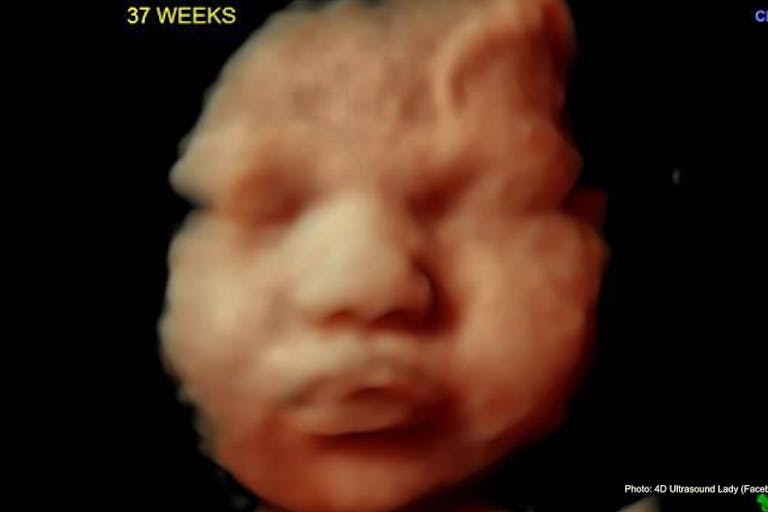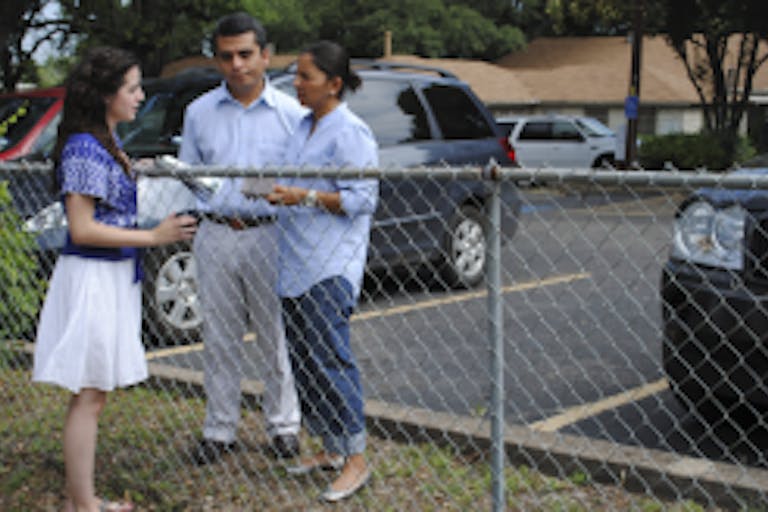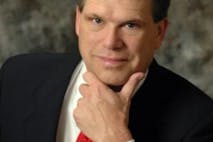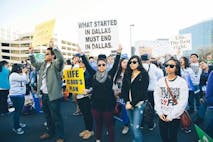
Prosecutors drop charges against Polish doctor who aborted baby in ninth month
Nancy Flanders
·
The do’s and don’ts of sidewalk counseling
Sidewalk counselors around the country celebrated the 9-0 Supreme Court ruling striking down an anti-sidewalk counseling buffer zone law enacted in Massachusetts in 2007. In the McCullen v. Coakley decision, all nine justices agreed unanimously that the sidewalk counseling law violates the First Amendment of the U.S. Constitution.
“By its very terms, the [Massachusetts] Act restricts access to ‘public way[s]’ and ‘sidewalk[s],’ places that have traditionally been open for speech activities,” wrote Chief Justice John Roberts in the opinion. “The government’s ability to regulate speech in such locations is ‘very limited.’ Roberts went on to say, “While the Act may allow petitioners to ‘protest’ outside the buffer zones, petitioners are not protestors; they seek not merely to express their opposition to abortion, but to engage in personal, caring, consensual conversations with women about various alternatives.” McCullen v. Coakley, 573 U.S. (2014).
It’s encouraging to read that the Chief Justice of the Supreme Court acknowledges that sidewalk counselors are focused on compassionate interaction with those entering abortion clinics. Unfortunately, many Americans still base their opinions of sidewalk counselors on what is reported by the liberal media. According to this portrayal, pro-life activists — specifically sidewalk counselors — are often perceived as antagonistic, incendiary, and confrontational.
In an effort to dispel this myth, Online for Life conducted an interview with David Sterrett, a pro-life activist who has been sidewalk counseling for three years. As the National Director of Church Outreach for Online for Life, Mr. Sterrett draws on his experience as a sidewalk counselor to give insight and understanding to this important component of the pro-life movement.
To help build awareness about sidewalk counseling, a portion of our interview with David Sterrett has been adapted and republished here:
Dave, tell us a little bit about yourself and your background with sidewalk counseling.
I’ve recently joined Online for Life as the National Director of Church Outreach. Before that, I was intimately involved with the pro-life movement, volunteering as a sidewalk counselor at several abortion clinics in and around Dallas, Texas.
This group was comprised of anyone from college students to elderly men and women. Part of our sidewalk counseling included offering assistance to the men and women entering the abortion clinic. Sometimes we would invite them to enter our mobile units where they could receive a free pregnancy test. Other times, we simply offered to usher them across the street to another care center that would provide free sonograms.
When you first entered this work, what is one of the first things you learned about the work and yourself in approaching men/women facing a crisis pregnancy?
Once I watched a nurse push a young woman in a wheelchair back to her car. Soon after, I watched another nurse walk side by side with another young woman who had also just completed her abortion. The pain on the faces of these ladies was real. One girl was in tears. The other looked dazed. My heart ached as I left the prayer vigil and returned to my car. I fought back tears as I drove away. That day, I made up my mind that I would commit to praying for God to end abortion.
I learned that most of the time, these men and women are wounded and have lost hope. Many women thought they had no choice. I also realized that sidewalk counseling was an opportunity to minister to the community. So often Christians are heavily involved in their churches yet have no idea that there is an abortion facility close to them. Many times, sidewalk counseling is an opportunity to get to know the staff at these facilities as well and encourage them to leave the abortion industry.
I continued sidewalk counseling in other states, including Virginia, where I had the opportunity to talk to several of the nurses and clinic guards about Jesus. Some were angry with me, while others appreciated my words of hope. I showed my concern for them by asking if I could help them find better employment elsewhere. I remember seeing happiness in the eyes of a young nurse as she exclaimed, “I’m leaving. I quit. Today was my last day working here.”
In being a part of this ministry over the years, what has proved to be the most successful method to reach these men/women in their moment of crisis?
Article continues below
Dear Reader,
In 2026, Live Action is heading straight where the battle is fiercest: college campuses.
We have a bold initiative to establish 100 Live Action campus chapters within the next year, and your partnership will make it a success!
Your support today will help train and equip young leaders, bring Live Action’s educational content into academic environments, host on-campus events and debates, and empower students to challenge the pro-abortion status quo with truth and compassion.
Invest in pro-life grassroots outreach and cultural formation with your DOUBLED year-end gift!
I believe sidewalk counseling should go hand and hand with prayer. Not everybody is called to sidewalk counsel, but I believe every Christian can join a prayer vigil like 40 Days for Life. According to 40 Days for Life, through their efforts over the years, 8,973 babies have been rescued, and 101 abortion workers have quit. We’re praying for the baby, the mother, the father, the community, and the abortion workers.
An interesting method for saving babies is to show models of babies at various stages of development in the womb to the women and men entering the abortion clinic. My friend Julie has helped to save about 1,000 babies by showing models of unborn babies as she sidewalk counsels. It also helps to show a sonogram image of an unborn child.
Having a mobile unit stationed outside of an abortion clinic — especially the clinics located in minority neighborhoods — is also a great deterrent of abortion. A friend of mine has rescued thousands of babies by placing his mobile unit outside a New York abortion facility.
Finally, knowing Spanish is a plus. Many Planned Parenthood abortion clinics are positioned in African-American and Hispanic communities. My friend Dan, who speaks fluent Spanish, has helped rescue 400 babies because he was able to communicate with the abortion-determined women.
On the other hand, what is one of the things you’ve learned needs to be avoided when reaching these men/women?
I think the key is to speak boldly…but in love. Proverbs 15:1 says, “A gentle answer turns away wrath, but a harsh word stirs up anger.” Not everybody is made to sidewalk counsel. It’s better when only one or two people sidewalk counsel while the majority of the people pray. Also, it’s helpful to learn from others what is most effective. For those wanting training, I encourage them to learn from those who have been active in this ministry for years. When I was new, I would brainstorm with Lauren Muzyka’s organization Sidewalk Advocates for Life, which you can learn about here.
When given the chance to speak with these mothers/fathers individually, what is one of the first things you share with them? What is something you are sure to remind them of before you part ways?
They need to understand that you are there to help them. When I first got started sidewalk counseling, I greeted a young man who was getting out of his car. As I asked him how he was doing, he told me he was taking his girlfriend to get an abortion. I looked him in the eyes and told him that at the moment of conception, all of the baby’s genetic information has already been established and that every surgical abortion stops a beating heart. I told him I’m so thankful that his mother chose life for him. Then I asked this young man to pray with me. We prayed and he gave me his phone number. I invited him to walk across the street to the pregnancy center and allow his girlfriend to get free professional counseling and sonogram services. Although they did not walk across the street with me to get a free sonogram, they did agree not to get an abortion that day.
What do you believe are the most common misconceptions about sidewalk counseling?
There’s a misconception amongst some Christians who are silent on the issue of abortion that sidewalk counselors are just protestors. Now, sometimes you’ll see a sidewalk counselor holding a graphic image of an abortion, but from my experience this is very rare. Usually, they have a peaceful sign that may say something such as Pray to End Abortion or We Are the Pro-life Generation. You might even see a child holding a sign with the Dr. Seuss quote from Horton Hears a Who! that reads A person’s a person, no matter how small.
There are some rare misconceptions amongst radical abortion supporters who might say sidewalk counselors “harass” women and are lawbreakers. But thankfully, in my opinion the majority of the American people don’t think that about sidewalk counselors. Most are individuals like Eleanor McCullen, a parishioner of St. Ignatius Parish in Boston, who are simply saying to women, “Can I help you?”
It was a big victory for sidewalk counselors in the McCullen v. Coakley United States Supreme Court case when the Court unanimously held that Massachusetts’ 35-feet fixed buffer zones around abortion clinics violated the First Amendment to the U.S. Constitution. Sidewalk counselors in America should be free to use public sidewalks to say whatever they want. Keep in mind that sidewalk counselors are technically permitted to yell and hold graphic images. Yet in my experience the vast majority of sidewalk counselors never do this. Like Eleanor McCullen, they’re just kindly offering help while joining other Christians in prayer.
To learn more about helping women and men facing unplanned pregnancies, visit OnlineforLife.org.
Live Action News is pro-life news and commentary from a pro-life perspective.
Contact editor@liveaction.org for questions, corrections, or if you are seeking permission to reprint any Live Action News content.
Guest Articles: To submit a guest article to Live Action News, email editor@liveaction.org with an attached Word document of 800-1000 words. Please also attach any photos relevant to your submission if applicable. If your submission is accepted for publication, you will be notified within three weeks. Guest articles are not compensated (see our Open License Agreement). Thank you for your interest in Live Action News!

Nancy Flanders
·
Issues
Angeline Tan
·
Guest Column
Emily Berning
·
Opinion
Nancy Flanders
·
Opinion
Mark Wiltz
·
Opinion
Mark Wiltz
·
Media
OnlineforLife.org
·
Issues
OnlineforLife.org
·
Issues
OnlineforLife.org
·
Human Rights
OnlineforLife.org
·
Opinion
OnlineforLife.org
·